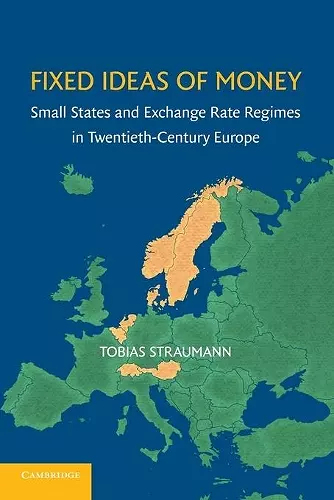Fixed Ideas of Money
Small States and Exchange Rate Regimes in Twentieth-Century Europe
Format:Paperback
Publisher:Cambridge University Press
Published:30th Jan '14
Currently unavailable, and unfortunately no date known when it will be back
This paperback is available in another edition too:
- Hardback£105.00(9780521112710)

This book analyses how seven small European countries dealt with major financial crises in the last hundred years.
This book analyses for the first time the experience of seven small states (Austria, Belgium, Denmark, The Netherlands, Norway, Sweden, and Switzerland) during the last hundred years. It shows that for most of the twentieth century policy makers' options were seriously constrained by a distinct fear of floating exchange rates.Most European countries are rather small, yet we know little about their monetary history. This book analyses for the first time the experience of seven small states (Austria, Belgium, Denmark, The Netherlands, Norway, Sweden, and Switzerland) during the last hundred years, starting with the restoration of the gold standard after World War I and ending with Sweden's rejection of the Euro in 2003. The comparative analysis shows that for the most part of the twentieth century the options of policy makers were seriously constrained by a distinct fear of floating exchange rates. Only with the crisis of the European Monetary System (EMS) in 1992–3 did the idea that a flexible exchange rate regime was suited for a small open economy gain currency. The book also analyses the differences among small states and concludes that economic structures or foreign policy orientations were far more important for the timing of regime changes than domestic institutions and policies.
'Tobias Straumann's excellent book breaks new ground. Informed by abundant research in archives and by the most recent theories from political economy, it provides an elegant and unified picture of the reasons why small nations in Western Europe have fixed their exchange rates and will prefer floating exchange rates.' Marc Flandreau, Graduate Institute of International Studies, Geneva
'Tobias Straumann has written an important and wide-ranging book that draws on history, economics, and political science to explain the central role that small states have played in shaping Europe's exchange rate arrangements.' Harold James, Princeton University
'A grand perspective on the small players of European monetary policy. This well-written, highly informative book will be a must-read for students of Europe's monetary history since 1918.' Albrecht Ritschl, London School of Economics
'After recent strains in the Eurozone, Straumann's study of how exchange rate policy developed in Europe is particularly timely. His detailed study of the experience of small states before and after the Bretton Woods era of pegged exchange rates offers a refreshing perspective on a literature that has concentrated on the larger European economies. Of particular novelty is the analysis of Switzerland, Norway, and Sweden alongside Austria, Belgium, Denmark, and the Netherlands. Straumann draws on an impressive range of contemporary sources to reinterpret the choices made by policymakers using direct evidence rather than extrapolating motives from the quantitative data. This volume will particularly attract those interested in expanding their understanding of European monetary relations and the way that smaller states engage in the global system.' Catherine Schenk, University of Glasgow
'A rich and thought-provoking study, which puts the monetary history of small European states into a new perspective. Straumann forcefully argues that size matters for monetary policy choices, for reasons far beyond the degree of economic integration.' Nikolaus Wolf, University of Warwick
ISBN: 9781107616370
Dimensions: 228mm x 152mm x 24mm
Weight: 634g
414 pages